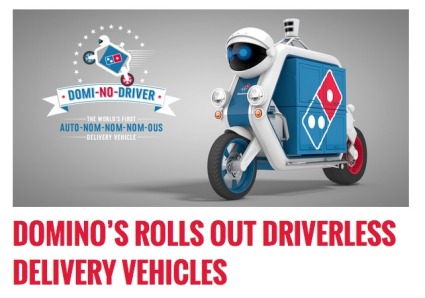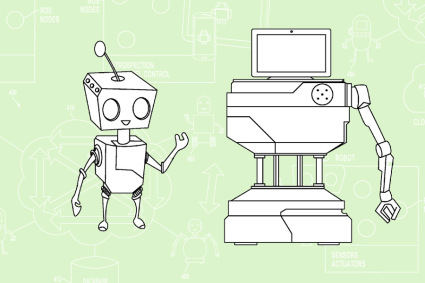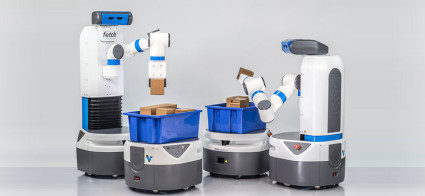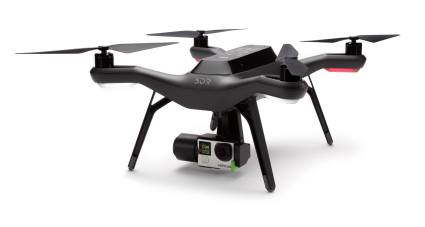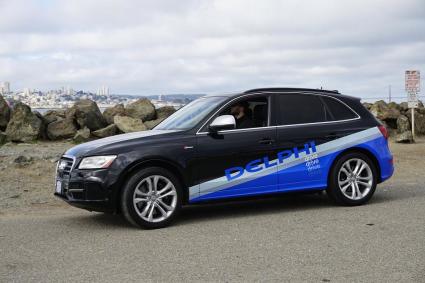
Robohub.org
Robohub Digest Apr. 2015: Robots get lost inside Fukushima, Google gets personality, and Bezos gets sub-orbital
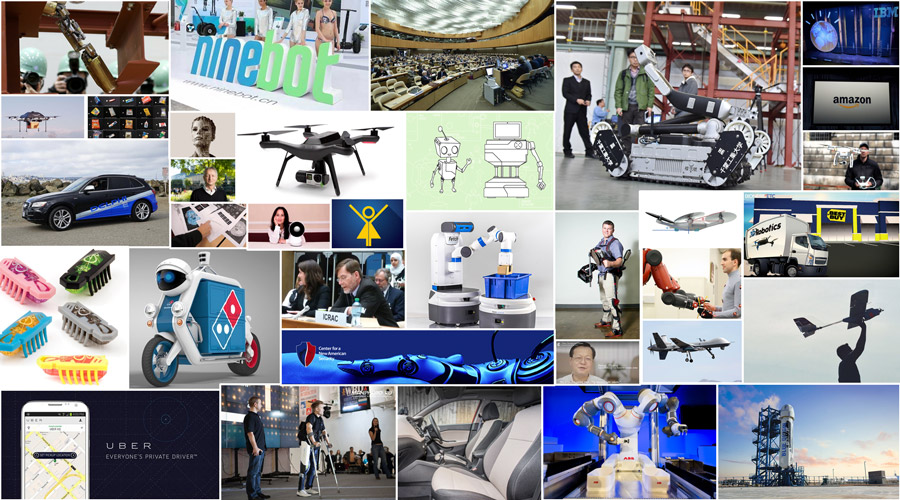 A quick, hassle-free way to stay on top of robotics news , our robotics digest is released on the first Monday of every month. Sign up to get it in your inbox.
A quick, hassle-free way to stay on top of robotics news , our robotics digest is released on the first Monday of every month. Sign up to get it in your inbox.
April Fools’
April began (how could it not?) with April Fools’ Day and an impressive range of robot-related hoaxes, inlcuding a “Domi-No-Driver” robotic pizza delivery vehicle, and a “parking ticket avoidance system” upgrade for Tesla’s Model S.
While these hoaxes were mostly just about fun, Frank Tobe argues in The Robot Report that the Domi-No-Driver is not so farfetched given the number of established companies – like FedEx, UPS, DHL and a myriad of restaurant chains in the US and especially China – that are all working on the concept.
Lost together
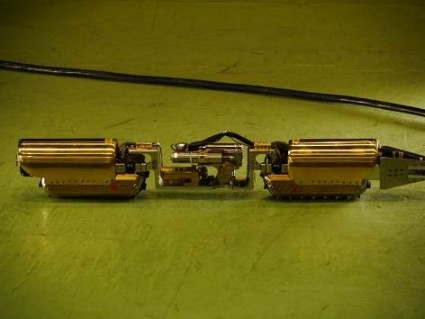
Tepco sent a snake robot inside Fukushima’s Reactor 1 this April to measure radiation levels.
Two robots were sent in to explore the stricken Fukushima power plant this April. Tokyo Electric Power Co (Tepco) sent a shape-shifting snake robot into the plant’s highly radioactive Reactor 1 to assess damage and radiation levels, but lost control of it three hours into the mission. They tried again with a second robot and were able to capture some haunting images before they lost control of this robot, too. Both robots remain inside the plant and Tepco has given up on recovery attempts. The mission is being hailed a success by the company despite the robots being lost; Tepco plans to use the data to inform the future decommissioning of the plants.
Google gets personality
Google was awarded a “robot personality patent” this month that outlines ways to download and customize the personality of a robot or computer. The general idea is to leverage cloud-robotics to build, store and download robot personalities that can adapt to owners’ personalities, habits and moods. Needless to say, the patent approval received significant media attention. In Automaton Blog, Kate Darling argued that the patent impedes innovation because Google got the patent without actively pursuing the technology. And on Robohub Mark Stephen Meadows points out that the patent is less about developing robot personalities, and more about collecting data about owners’ personalities – something that could ultimately be used to influence our purchasing decisions. Given that Google’s business model centers around data collection, this does not seem so far fetched.
More big player news
Google is not the only big player in the data business, however. This month IBM teamed up with Apple on an artificial intelligence health program set to glean life-saving insights by tapping into the vast amounts of health data available through personal devices and digital records.
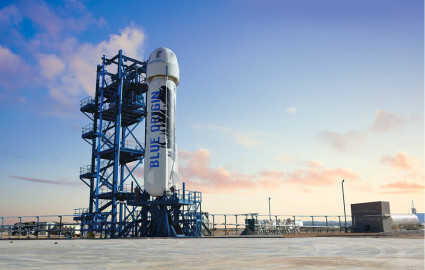
On April 29, 2015, Blue Origin (founded by Amazon’s Jeff Bezos) conducted its first successful test of a reusable rocket designed to take tourists into space.
Meanwhile, Amazon Web Services made its Amazon Machine Learning available to developers looking to use AI modelling in their own apps and web-services. And another branch of the internet giant got an FAA exemption, allowing it to test Amazon Prime Air delivery drones in US airspace, albeit under tight restrictions. The exemption came one week after Amazon had criticized the FAA’s rulemaking process in a U.S. Senate hearing. Also connected to Amazon was Blue Origin’s successful test of its New Shepherd rocket – Blue Origin was founded in 2000 by Amazon’s CEO, Jeff Bezos. The vehicle is designed for commercial space flights and could one day take up to six tourists into space at a time.
Industry launches
In other industry news, Fetch Robotics launched its Fetch and Freight robot system for warehouses. The system comprises two separate robots, one mobile manipulator (Fetch) to get items from shelves, and a much smaller, faster robot base (Freight) to move and deliver items. The two collaborate to form a system that is intended to be more flexible than existing warehouse fulfillment solutions, giving competitors like Kiva and Swisslog a run for their money.
Another launch came when global leader in power and automation technologies ABB showcased their new two-armed YuMi robot at this year’s Hannover Messe, at the same time announcing they had bought German start-up gomTec, maker of the one-armed “co-bot”.
And Ekso Bionics, a manufacturer of wearable robots, announced their new “Works” exoskeleton aimed at the industrial and construction markets. They are also planning a new robotic body suit to support the elderly.
Consumer drone competition heats up
Competition is fierce in the world of consumer drones these days, especially among companies marketing products than can produce pro quality video and photography without having to hire a drone operator or a camera person. April saw the launch of new Phantom UAVs with suped up cameras from DJI as well as the Solo drone by 3D Robotics, whose products will be available on the shelves at 400 locations of retailer Best Buy starting in May. Also just launched is a new Kickstarter campaign by Helen Greiner’s Cyphyworks for their new LVL 1 drone, which they hope will have you filming “right out of the box”.
With all these developments and no sign of slowing down, it is no wonder that the commercial drone market is expected to grow by 109% annually.
Autonomous Driving
You may recall the announcement last February that Uber is partnering with CMU to develop autonomous cars; this month the company is hiring engineers for its robotics centre in Pittsburgh. Meanwhile, Deplhi has successfully completed the trans-continental test drive of its robocar, and Hyundai is planning to invest $70 million to ensure the first commercialised robocars hit our roads by 2020.
Asia news

Chinese VCs are shopping for global robotics ventures.
With notable buyouts including Segway and SMD, and a $200M partnership with Russia’s Skolkovo Foundation, Chinese venture capital firms have been busy this month working to import foreign robotics tech and knowledge into the country. The Chinese robotics market is growing fast and robot deployment within the manufacturing sector is being actively encouraged to boost capacity.
Elsewhere in Asia, initiatives are underway to train workers in automation and robotics with the goal to boost the use of technology within manufacturing and service industries.
UN debates killer robots

United Nations Convention on Certain Conventional Weapons meeting, discuss Lethal Autonomous Weapons (LAWS). Credit: United Nations.
On the 13th of April, delegates from the United Nations came together to discuss Lethal Autonomous Weapons Systems (LAWS). As calls to stop killer robots got louder, representatives from member states outlined their nations’ stance on the subject, listened to expert presentations and developed a framework for future debates.
To help people learn more about the issues, the Centre for the Study of the Done published a primer outlining the current knowledge of and experience with killer robots. See also the Open Roboethics Initiative’s survey exploring attitudes about autonomous military weapons versus remote-controlled ones.
AI

Talking Machines is a new bi-weekly podcast series featured on Robohub that brings you clear conversations with experts in the fields of AI and machine learning.
Much like killer robots, AI has long been a controversial topic, with big names like Stephen Hawking and Elon Musk voicing concerns. This month, Apple co-founder Steve Wozniak joined in, wondering out loud in an interview with the Australian Financial Review whether AI could turn us into “family pets”. Oxford Professor Nick Bostrom also suggested caution, and calling on Google and Facebook to help ensure AI stays friendly and safe.
Despite the worries and warnings, engineers working at the cold face of AI are feeling positive about their work and don’t tend to agree with the fears and concerns that surround the field. To learn more about AI’s early days, we recommend the Star’s article on one of the grandfathers of deep learning, Geoffrey Hinton, and Max Welling’s video primer on the subject.
Women in robotics
Steffi Paepcki from OSRF argues that robots designed and built exclusively by men (or exclusively by women, for that matter) will fail to meet the needs of half their users.
Robotics, like many of the related STEM subjects, is a field dominated mostly by men. And yet there are an increasing number of women who have dared to venture into this male domain and who have persevered. This month Lauren Orsini shared the encouraging stories of four women and their pathways into a successful robotics career, OSRF’s Steffi Paepcke outlined the many opportunities for women in robotics, and Silicon Valley Robotics Director Andra Keay hosted a panel discussion titled “Women in Robotics: Challenge or Opportunity?” as part of her Influencers series.
And the all-women organising committee at ICRA is in the final preparations for the premiere academic robotics event coming up this May in Seattle, WA. Preview the latest in robotics and AI in the video trailer:
(Multiple languages available here.)
Robots on campus
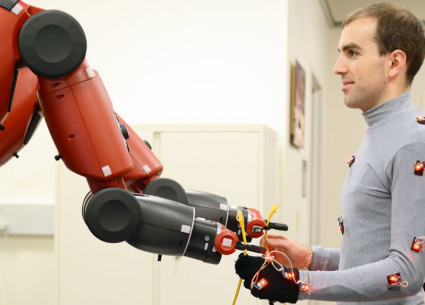
People and Robots: UC’s new multidisciplinary CITRIS initiative wants humans in the loop. Photo credit: Aaron Bestick, UC Berkeley.
In the world of academia, the University of Michigan has approved the construction of a new $54 million research facility for its robotics program. The high-tech centre will house office space, classrooms and state of the art laboratories. Meanwhile, the University of California’s Center for Information Technology Research in the Interest of Society (CITRIS) has launched an initiative that wants to keep “humans in the loop”.
Finally, a computer programme developed at Carnegie Mellon University called “Claudico” is facing human poker pros Doug Polk, Dong Kim, Bjorn Li and Jason Les in a two week no-limit Texas Hold’Em poker competition. Set to end on 7th of May, the competition will test Claudico’s intelligence and ability to call a bluff.
Events
April saw the University of Washington host 2015’s We Robot conference, an event focused on robotics, law and policy. Kate Darling of the Massachusetts Institute of Technology, discussed her research on how anthropomorphic framing can affect our behaviour with respect to robots. Tweets from the event can be found here and more coverage of the event will be published on Robohub in the coming month.
The US National Robotics Week also took place this April with a myriad of activities and presentations across the country.
Upcoming events
- AUVSI Unmanned Systems Conference & Trade Show – Atlanta, GA, USA
May 4, 2015 – May 7, 2015 - Binaural Hearing for Robots – MOOC – hosted by INRIA
May 11, 2015 – June 12, 2015 - RoboUniverse New York – New York, NY, USA
May 11, 2015 – May 13, 2015
Use discount code ROBOHUB for 10% off all pass types. - Mobile Robots and Autonomous Vehicles – MOOC – hosted by INRIA
May 18, 2015 – June 21, 2015 - 2015 CES Asia – Shanghai, China
May 25, 2015 – May 27, 2015 - ICRA 2015 – Seattle, WA, USA – Check out the ICRA video trailer!!
May 26, 2015 – May 30, 2015 - Communicating robotics in 140 characters or less: Strategies, pitfalls and success stories in leveraging social media to promote your research – ICRA Social Media Workshop – hosted Robohub @ICRA, Seattle, WA, USA
May 26, 2015
This noontime workshop includes a light lunch for registered participants.
tags: Robohub Digest


